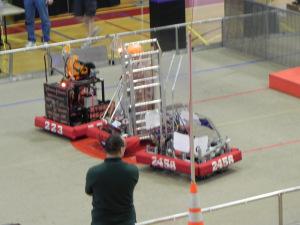It has been several years now since I’ve been directly (or indirectly) involved in robotics.During my daughter’s high school years I was active in the FIRST Robotics program, spending some week nights and many weekends supporting the kids—far more clever than me—building and competing with the robot.It was during this time that I came to know some of the mentors involved.They knew I was looking for a job in a field not their own.Instead of wringing their hands like my professorial colleagues did, they made concrete suggestions as to how to go about finding a reasonable position.Unlike many religion professors, they were willing to go out of their way to help.It’s a lesson I’ve never forgotten.A somewhat well-known religious leader is known for having said “by their fruits you will know them.”So it is.

One of these friends recently sent me a New York Times story about a disabled toddler.Because of our government’s very compassion health care system, this boy was denied access to a wheelchair.When the local high school robotics team learned about it they designed and built a motorized chair for the boy.Again, my point couldn’t be more obvious.This team did what was the right thing.They didn’t stand around saying the family would be in their thoughts and prayers.No, they did something about it.While the story made me feel good, it also saddened me.I’ve been part of the religious studies community for at least three decades now.When I lift up mine eyes to the hills, however, whence cometh my help?
Please don’t get me wrong—I know probably better than most how difficult life and funding can be as a humanities academic.I also know, however, that humanities are nothing without humanity.How easy it is to forget that when a tenure-track position opens up!There are creative solutions possible.I have suggested them to those empowered to enact them from time to time.Their response has generally been to explain why it can’t be done rather than giving it the old college try.In robotics you try to see if it works before deciding it can’t.Perhaps there’s a message here for those who hear.Engineers find solutions while many academics find excuses.There’s any number of reasons not to help the boy get a wheelchair: somebody’s going to have to pay for this, there are other things that demand the students’ time, there are government agencies who already do the work.Or.You can try because it’s the right thing to do.Whose fruit tastes better, I wonder?
